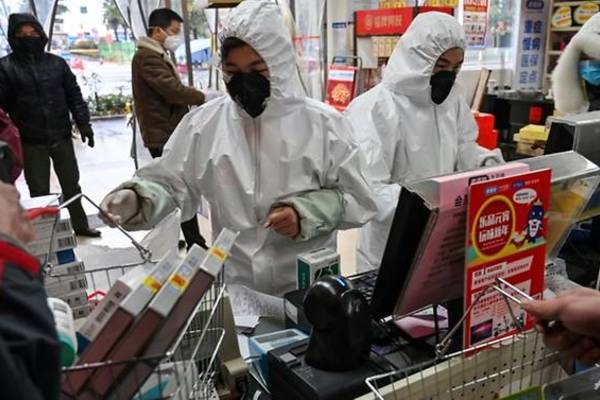BRUSSELS BEHIND THE SCENES
Weekly analysis and untold stories
With SAMUEL STOLTON
Other Brussels behind the scenes stories:
The curious case of the Commission President's mobile phones
Could Europe contract the deadly
Chinese marketplace malady?
A large poster outside the Huanan seafood market in Wuhan details an array of delights on offer. In addition to the essentials such as fox, snake, ostrich, bat and camel, there is also a palatable selection of rodents and an assortment of live animals that have become a staple in the Chinese diet: A mouth-watering medley of dog, pigs, and civets.
At some point over the last month or so, a 61-year old man had been routinely and unassumingly lumbering in-between the crowded market stalls of the warehouse. Hooks of freshly slaughtered cow hanging above – chunks of meat dripping a crimson syrup into the pools of rainwater on the concrete floor, the exotic fish twisting rowdily in their tanks - lobsters with their pincers clasped together by elastic bands attempt to fight one another to no avail, and the balding, half-dead chickens letting off a bitter, putrid smell – emanating from the dried excrement crusting across the wired doors of their enclosure.
Sent out every Friday afternoon, BRUSSELS BEHIND THE SCENES brings the untold stories about the characters driving the policies affecting our lives. Analysis not found anywhere else, The Brussels Times' Samuel Stolton helps you make sense of what is happening in Brussels.
If you want to receive Brussels behind the scenes straight to your inbox every Friday, subscribe to the newsletter here.
At some point over the last month or so, a 61-year old man had been routinely and unassumingly lumbering in-between the crowded market stalls of the warehouse. Hooks of freshly slaughtered cow hanging above – chunks of meat dripping a crimson syrup into the pools of rainwater on the concrete floor, the exotic fish twisting rowdily in their tanks - lobsters with their pincers clasped together by elastic bands attempt to fight one another to no avail, and the balding, half-dead chickens letting off a bitter, putrid smell – emanating from the dried excrement crusting across the wired doors of their enclosure.
Ferociously kicking its hind legs, a hare instinctively and desperately struggles for its little life (as if it has something to live for – its sinewy, wiry flesh condemned from birth to surface one day in between the teeth of a ravenous consumer). It is raised with a bony arm to the luminescent lights above, and a silver knife swiftly and silently lacerates its throat. Blood pours like a waterfall.
As the 61-year-old man walks past the multitude of stalls packed tightly into this warehouse, the caged dogs, red veins protruding from their mad eyes, bark wildly – their calls ringing into the congested street outside.
At some point in this man’s customary marketplace meander, a deadly viral blend has been concocted. Among the thick, dead flesh hanging from the stalls and the shivering rodents heaped into large plastic barrels, this is the house by which ‘the virus’ was born.
The 61-year-old man died on January 9th of severe pneumonia, the first to perish after having contracted the virus. Since then, 25 people have been killed, and, at the time of writing, over 830 people are believed to have been infected. Local authorities have banned public transport in Wuhan, a city of 11 million inhabitants, and Airlines have cancelled fights at the height of the holiday season in the country - with the traditional Lunar New Year celebrations just around the corner.
Neighbouring cities including Huanggang, Ezhou, Zhijiang, Chibi, as well as Xiantao, Qianjiang and Enshi have also imposed travel restrictions and cases have also been discovered in Japan, South Korea, Thailand and the US.
BRUSSELS BEHIND THE SCENES POWERED THIS WEEK BY
In Europe, health authorities are on standby, should the virus emerge. One of the challenges for medical professionals in identifying the potentially lethal strand of coronavirus so far has been the fact that the symptoms surface relatively mildly and include common respiratory problems traditionally associated with pneumonia - fever, coughing and a shortness of breath being the most common. The more serious signs include severe acute respiratory syndrome and kidney failure, according to the World Health Orgnisation (WHO).
In the UK, tests are taking place. On Thursday evening, Public Health England revealed that fourteen people have been screened. Five have been cleared while nine are still awaiting results. Speaking to the House of Commons yesterday, UK health secretary Matt Hancock said that the country is “well-prepared and well-equipped” to deal with any future cases.
On Wednesday, the European Centre for Disease Prevention and Control (ECDC) said that there was a ‘moderate’ risk that the virus may manifest in Europe, and the Platform for European Preparedness Against (Re-)emerging Epidemics has activated its ‘Mode 1’ warning system – believing there to be a “credible threat for a pandemic” on the continent, according to Euronews.
Other medical authorities, meanwhile, are attempting to alleviate fears that the disease could spread further. In Belgium, the Flemish Agency for Care and Health has said that there is a “low risk” of the infection being introduced in the country, while yesterday, the Director-general of WHO, Dr Tedros Adhanom Ghebreyesus, said that the contagion has not yet become a global health emergency. “It could yet become one,” he added, however.
Alarm bells had originally sounded when medical professionals realised that the virus could be transmitted from one human to another - making the task of global authorities much more challenging during a time in which millions of Chinese people are on the move. That, coupled with the relatively mild symptoms of carriers as well as the fact that symptoms themselves may take up to 14 days to appear in those who have contracted the virus, create a situation in which there is more ambiguity rather than clarity on whether Europe could be exposed to the deadly disease. It is also relevant to note that prior to the Chinese authorities closing the doors to the Wuhan airport, direct flights had been regularly taking place between the city and London, Paris and Rome.
Today, Wuhan is a ghost town. Military guards patrol the central transport hubs, shops remain shut, and residents have either fled the region or are holed up in their homes. Infirmaries are overrun with patients, and a number of hospitals in the area, including the Wuhan Children’s Hospital, the Hubei General Hospital, the Renmin Hospital of Wuhan University and the Central Hospital of Wuhan, have made public appeals for assistance and supplies.
For its part, Europe remains on standby. Largely ignorant as to whether or not the virus has already reached its shores, the continent is suspended in somewhat of an arrested state – not wanting to stoke fears, but also lingering vigilantly for any potential onset of the ‘marketplace malady’ on the continent.
Sent out every Friday afternoon, BRUSSELS BEHIND THE SCENES brings the untold stories about the characters driving the policies affecting our lives. Analysis not found anywhere else, The Brussels Times' Samuel Stolton helps you make sense of what is happening in Brussels.
If you want to receive Brussels behind the scenes straight to your inbox every Friday, subscribe to the newsletter here.


